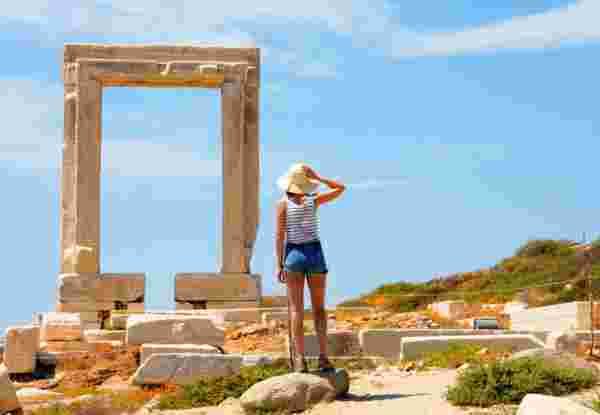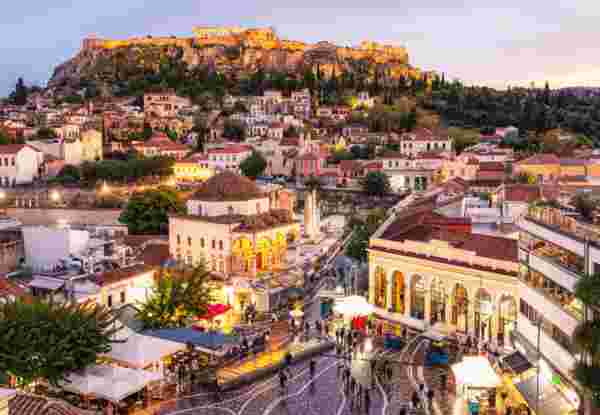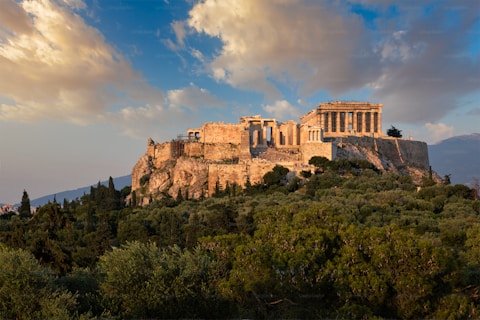Insider Tips: Is Greece Safe to Travel to?

Planning a trip to Greece and wondering if Greece is safe to travel to? Rest assured; Greece is a popular tourist destination known for its welcoming atmosphere. While it’s always wise to take normal precautions as you would in any other country, Greece is safe to travel to. From vibrant cities to idyllic Greek islands, you can explore this beautiful country with peace of mind, especially with the right travel insurance in place.

Understanding Safety in Greece
Safety in Greece is often a topic of interest for first-time visitors. It’s important to remember that like any other destination, Greece has its safe areas and areas where a little extra caution is advised.
The Current Safety Climate in Greece for Tourists
Greece maintains a reputation as a safe place for tourists. The local authorities are proactive in ensuring the well-being of visitors. Public transport, especially in cities like Athens and Thessaloniki, is considered safe, efficient, and affordable. While petty theft can occur in crowded areas, common-sense precautions such as securing valuables and being aware of your surroundings can significantly minimize risks.
Common Concerns: Health, Crime, and Natural Disasters
While planning your trip to Greece, it’s essential to address common concerns regarding health, crime, and natural disasters. Greece is generally safe for tourists, but like any other destination, it’s wise to take normal precautions. In terms of health, ensure you are up-to-date on vaccinations, especially if you plan on visiting rural areas. Crime rates are relatively low, but it’s always best to use common sense and safeguard your belongings. Regarding natural disasters, particularly in summer, be aware of heatwaves and wildfires, primarily in the peak season. Stay informed about safety measures and follow advice from local authorities to ensure a secure and enjoyable trip. Remember to pack light clothing and travel insurance for any unforeseen events.
How does Greece’s safety compare to other European countries?
Greece’s safety record aligns favorably with other popular European destinations. Its crime rates are generally lower compared to some major cities in other parts of Europe. The Greek islands, especially, are known for their tranquil and secure environments. As always, exercising normal precautions goes a long way in ensuring a safe and enjoyable trip.

Navigating Greek Cities Safely
Navigating bustling Greek cities like Athens or Thessaloniki is generally straightforward. With a blend of ancient history and modern amenities, these urban areas offer a vibrant cultural experience.
Tips for Safe Transportation within Urban Areas
Public transportation is an excellent way to traverse Greek cities. The metro system, particularly in Athens, is well-maintained, efficient, and safe. Taxis are readily available, with ride-hailing apps like Uber also operational in larger cities. When using taxis, ensure they are licensed. At night, consider opting for pre-booked transportation or ride-hailing services for added safety.
Nightlife Safety: How to Enjoy Greece After Dark
Greece’s nightlife is vibrant and diverse, with options ranging from traditional tavernas to trendy bars and clubs. To ensure a safe and enjoyable experience, stick to well-lit and populated areas, especially if you are alone. Be mindful of your alcohol intake and avoid walking alone in deserted areas late at night. As always, common sense and awareness play a key role in staying safe after dark.
Areas to Avoid: Insights from Locals and Frequent Travelers
While Greece is generally safe, like any destination, there are areas to approach with caution. Insights from locals and frequent travelers suggest avoiding certain neighborhoods in Athens, particularly in the city center late at night. Exercise vigilance in crowded tourist spots like Monastiraki and Omonia Square to thwart pickpocketing. In Thessaloniki, certain areas near train stations require extra awareness. When exploring rural areas, stay informed about any local tensions or demonstrations that might escalate. By staying updated on the current situation and heeding advice from local authorities and experienced travelers, you can ensure a safe and enjoyable trip to Greece.
You might find this usefull: The Ultimate Athens Travel Guide

The Reality of Crime in Greece: What Travelers Need to Know
Like many tourist destinations, Greece experiences its share of petty crime. Understanding the types of crime and taking preventative measures can help safeguard your belongings and ensure a worry-free trip.
Petty Theft and Scams: Precautions and Prevention
The most common crime targeting tourists in Greece is petty theft, particularly in crowded areas like markets, tourist sites, and public transportation. To mitigate risk, be mindful of your belongings at all times. Avoid carrying large amounts of cash and consider using a money belt or secure pouch for valuables and credit cards. It’s also recommended to keep a separate copy of your passport and important documents.
Violent Crime: Statistics and Safety Advice
Violent crime in Greece is relatively rare, especially among tourists. However, exercising precautions is always recommended. Avoid walking alone late at night, particularly in unfamiliar or deserted areas. If you encounter any suspicious activity, remove yourself from the situation and seek assistance from local authorities or your accommodation. Remember, your safety is paramount.

Local Emergency Contacts
In case of emergencies during your trip to Greece, it’s essential to know how to contact the local authorities. Familiarize yourself with these emergency numbers to ensure you can access help swiftly if needed. Having these numbers readily available can save valuable time in critical situations.
Police
In Greece, you can dial 100 to reach the police in case of an emergency. This number connects you to the Hellenic Police, who are responsible for maintaining law and order throughout the country.
Tourist Police
Specifically for tourists, Greece has a dedicated Tourist Police division that can be reached by dialing 1571. These officers are trained to assist visitors with various issues, including reporting crimes, providing information, or addressing safety concerns. They are often multilingual, ensuring easier communication for travelers.
Medical Emergencies
For medical emergencies in Greece, dial 166 to connect with the Emergency Medical Services (EKAB). It’s crucial to have travel insurance that covers medical expenses and repatriation to your home country if necessary.
Fire and Rescue Services
In Greece, fire and rescue services play a crucial role in ensuring public safety. The country has well-equipped emergency response teams that are trained to handle various situations efficiently. Especially during peak season when the risk of wildfires is higher, these services are on high alert. Local authorities work in collaboration with security forces to promptly address any incidents. It’s recommended to stay informed about evacuation procedures and follow the guidance of authorities in case of emergencies. Travelers should also take normal precautions, such as being aware of fire risks in rural areas and adhering to safety guidelines to prevent accidents.

Health and Medical Services for Tourists in Greece
Greece offers readily available healthcare services, including accessible medical care for tourists. Understanding how to access healthcare as a visitor and the availability of pharmacies can contribute to a smooth and enjoyable travel experience.
Accessing Healthcare as a Visitor: What You Need to Know
Tourists from most European countries can access healthcare in Greece using their European Health Insurance Card (EHIC). This card grants you access to state-provided healthcare at a reduced cost or, in some cases, for free. It’s essential to have comprehensive travel insurance that complements your EHIC coverage. Before your trip, research medical facilities near your accommodation or itinerary.
Pharmacy Availability and Emergency Services
Pharmacies are widely available in Greece, especially in urban and tourist areas. They are typically well-stocked with over-the-counter medications, first-aid supplies, and prescription drugs. In case of emergency, you can reach emergency services by dialing 112, which connects you to an operator who can dispatch the necessary assistance, including ambulances and medical professionals.

Natural Disasters in Greece: Preparation and Response
Greece is prone to certain natural events, with earthquakes and wildfires being the most common. Understanding these risks, taking necessary precautions, and knowing how to respond effectively can significantly enhance your safety during your trip.
Earthquakes and Wildfires
Greece lies in a seismically active region and occasionally experiences earthquakes. It’s advisable to be aware of earthquake safety procedures, such as seeking cover under sturdy furniture during tremors. Wildfires are more frequent during the hot and dry summer months, particularly in forested areas. Pay attention to fire warnings, avoid starting open fires, and be prepared for potential evacuations if necessary.
Seasonal Weather Patterns
Greece enjoys a Mediterranean climate with hot, dry summers and mild, wet winters. Summer temperatures can soar, especially during peak season. Ensure you pack appropriately with light clothing, sunscreen, and a hat for protection from the sun. During winter, be prepared for occasional rainfall and pack accordingly with waterproof clothing and comfortable shoes.

Tips for Solo Travelers: Staying Safe While Exploring Alone
Traveling solo in Greece can be an enriching experience. Immersing yourself in the culture, history, and landscapes at your own pace offers a unique sense of freedom. To ensure your safety while exploring independently, consider these tips tailored for adventurous spirits.
Connecting with Other Travelers and Locals
Staying in hostels or joining group tours can be a great way for solo travelers to connect with others. Engaging in conversations with locals can provide valuable insights into the best places to visit, eat, and explore. Moreover, informing trusted individuals about your itinerary and whereabouts can provide an extra layer of safety during your solo adventure.
Personal Safety Apps and Tools for Solo Adventurers
Leverage technology to enhance your safety while traveling solo. Share your live location with trusted contacts and utilize personal safety apps designed for solo travelers. Consider carrying a personal alarm or whistle for added security. Remember, preparation and awareness are key to mitigating potential risks.
Is it safe for solo female travelers to visit Greece?
Solo female travelers can generally explore Greece safely by exercising the same precautions they would in any other destination. Be mindful of your surroundings, and avoid walking alone in deserted areas, especially at night. As a safe place with a welcoming culture, Greece offers amazing experiences for those venturing out on their own, regardless of gender.
In conclusion, traveling to Greece can be a safe and enjoyable experience with the right precautions. Is Greece safe to travel to? Yes, it can be, as long as you understand the safety climate, navigate cities wisely, and are aware of local emergency contacts. By staying informed about common concerns like health, crime, and natural disasters, travelers can have a more relaxed and memorable visit. Remember, solo travelers should also prioritize personal safety through connections with locals and the use of safety apps. With proper planning and awareness, exploring the beauty of Greece can be a rewarding adventure.
Feeling Ready?
From our blog

Honeymoon in Naxos: A Complete Guide
READ MORE
Visiting Athens with Kids: A helpful Guide
READ MORE
Paros for Seniors: Tips and Itinerary
READ MORE
Best Resorts in Greece for Families: Your Ultimate 2025 Guide
READ MORE
How to Enjoy Santorini for Seniors
READ MORE
Honeymoon in Paros Island
READ MORE
Rome Travel Guide: What to Do, When to go and Where to Go
READ MORE
The Best Greek Islands for Couples, According to a Luxury DMC
READ MORE
Discover Milan: Top Attractions
READ MORE



